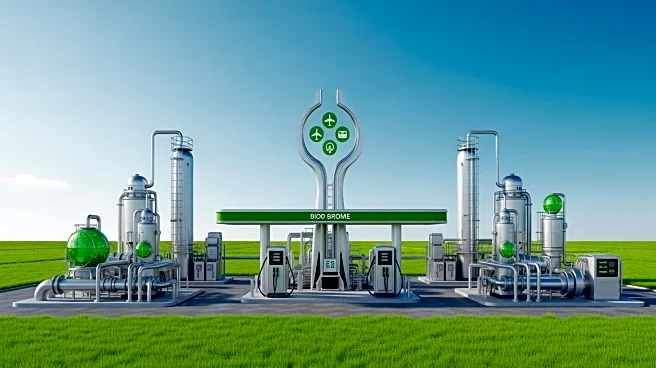What's Happening?
Ethiopia is making significant strides in its energy and transportation sectors with the development of a 23,000-hectare agricultural biorefinery. This initiative is a collaboration between Sunbird Bioenergy
Africa and the Ethiopian Mining Corporation (EMC), aiming to commence operations by 2030. The biorefinery will produce Sustainable Aviation Fuel (SAF), household biofuels, and ethanol for transport. The project is expected to meet a projected demand of 530,000 million liters of SAF per year by 2028-2030, and produce 120-150 million liters of household clean cooking fuel annually from 2025-2030. Additionally, transport ethanol blends are anticipated to reach 115-230 million liters per year in the same period. The project will utilize local feedstocks like cassava and sugarcane, promoting rural employment and agricultural development. Sunbird Bioenergy will oversee renewable fuel production, while EMC will provide industrial expertise and infrastructure support.
Why It's Important?
This development is crucial for Ethiopia's energy transition, as it aims to reduce reliance on traditional fossil fuels and enhance energy self-sufficiency. By focusing on biofuels, Ethiopia is positioning itself to meet future energy demands sustainably, which could significantly impact its economy and environment. The project supports Ethiopia's broader shift towards electric vehicles, liquefied natural gas, and compressed natural gas, aligning with global trends towards cleaner energy. The initiative also promises to create jobs and stimulate local agriculture, contributing to economic growth. Furthermore, the involvement of international partners like the World Bank highlights the project's potential to attract global investment, which could further bolster Ethiopia's energy infrastructure and economic resilience.
What's Next?
The biorefinery is expected to be operational within five years, with EMC playing a key role in supplying jet fuel to Ethiopian Airlines. As the project progresses, it will likely attract more international attention and investment, potentially leading to further advancements in Ethiopia's energy sector. The government’s continued support for electric vehicles and expansion of LNG production will complement the biofuel initiative, potentially positioning Ethiopia as a leader in sustainable energy in Africa. Stakeholders will be closely monitoring the project's impact on local communities and the environment, as well as its ability to meet projected production targets.
Beyond the Headlines
The project underscores a significant shift in Ethiopia's energy policy, reflecting a growing global emphasis on sustainability and climate change mitigation. By investing in biofuels, Ethiopia is not only addressing its energy needs but also contributing to global efforts to reduce carbon emissions. This initiative could serve as a model for other African nations seeking to balance economic development with environmental stewardship. The project's success could also influence regional energy policies, encouraging more countries to explore renewable energy solutions.










